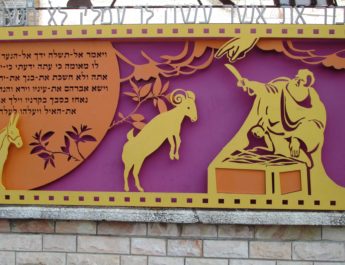1 Corinthians 1:1-9
Second Sunday after Epiphany A
1 Paul,A calledB to be an apostleC
A “Paul” = Paulos. From Latin Paulus (small, little). This is Paul or Paulos, meaning little.
B “called” = kletos. 11x in NT. From the same as klesis (calling, invitation); from kaleo (to call by name, invite, to name, bid, summon, call aloud); related to keleuo (to command, order, direct); from kelomai (to urge on). This is the called, invited, calling. Used in the NT as God’s calling.
C “apostle” = apostolos. From apostello (to send, send away, send forth as a messenger, to commission); {from apo (from, away from) + stello (to set, arrange, prepare, provide for); {probably from histemi (to stand, place, set up, establish, stand firm)}}. This is a messenger – someone sent out on a mission as an envoy or delegate. It can also refer to someone set at liberty. Generally, this is a messenger who is meant to be a representative of the one who sent them. They are thus, set apart on a mission literally or figuratively.
of ChristD JesusE by the willF
D “Christ” = Christos. From chrio (consecrate by anointing with oil; often done for prophets, priests, or kings). Literally, the anointed one, Christ. The Greek word for Messiah.
E “Jesus” = Iesous. From Hebrew Yehoshua (Joshua, the Lord is salvation); {from YHVH (proper name of the God of Israel; the self-existent and eternal one); {from havah (to become) or from hayah (to come to pass, become, be)} + yasha (to deliver, defend, help, preserve, rescue; properly, to be open, wide or free, which implies being safe. So, in a causative sense, this is to free someone)}. This is Jesus or Joshua in Greek – the Lord saves or the Lord is salvation.
F “will” = thelema. From thelo (to desire, wise, will, intend). This is the act of will, choice, purpose, or decree.
of God,G and our brotherH Sosthenes,I
G “God” = Theos. From Proto-Indo-European origins, meaning do, put, place. This is God or a god in general.
H “brother” = adelphos. From a (with, community, fellowship) + delphus (womb). This is a brother in a literal or figurative sense. It is also used of another member of the Church.
I “Sosthenes” = Sosthenes. 2x in NT. From the same as sozo (to save, heal, preserve, or rescue; taking someone from danger to safety; delivering or protecting literally or figuratively); {from sos (safe, rescued, well)} + sthenoo (to strengthen so that one can be mobile); {from sthenos (strength)}. This is Sosthenes, meaning “of safe strength.”
2 To the churchJ of God that is in Corinth,K to those who are sanctifiedL in Christ Jesus,
J “church” = ekklesia. Related to “called” in v1. From ek (from, out from) + kaleo (see note B above). This is properly a calling out or an assembly. It was used to refer to a church.
K “Corinth” = Korinthos. 6x in NT. From “Pre-Greek Pelasgian kar (point, peak); perhaps named after Corinthos, a descendant of the god Zeus.” This is Corinth. See https://en.wiktionary.org/wiki/%CE%9A%CF%8C%CF%81%CE%B9%CE%BD%CE%B8%CE%BF%CF%82#Ancient_Greek & https://en.wikipedia.org/wiki/Ancient_Corinth
L “sanctified” = hagiazo. From hagios (sacred, holy, set apart, different other; physically pure, morally blameless, or ceremonially set apart); from hagnos (holy, sacred, pure ethically, ritually, or ceremonially; prepared for worship, chaste, unadulterated, pure to the core; undefiled by sin; figurative for innocent, modest, perfect). This is to make holy, consecrate, sanctify, set apart as holy, purify, venerate.
called to be saints,M together with allN those who in everyO placeP
M “saints” = hagios. Related to “sanctified” in v2. See note L above.
N “all” = pas. This is all or every.
O “every” = pas. Same as “all” in v2. See note N above.
P “place” = topos. This is a place or region. It is a smaller space that can only hold a limited number of people whereas chora is a larger place. Figuratively it could be an opportunity.
call onQ the nameR of our LordS Jesus Christ, both their Lord and ours:
Q “call on” = epikaleo. Related to “called” in v1 & “church” in v2. From epi (on, upon, among, what is fitting) + kaleo (see note B above). This is to call on, appeal to, worship, invoke for help.
R “name” = onoma. May be from ginosko (know, recognize, learn from firsthand experience). This is a name, authority, cause, character, fame, reputation. The name was thought to include something of the essence of the person so it was not thought to be separate from the person.
S “Lord” = Kurios. From kuros (authority, supremacy). This is a respectful address meaning master or sir. It refers to one who has control or power greater than one’s own. So, it was also applied to God and Jesus as Master or Lord.
3 GraceT to you and peaceU from God our FatherV and the Lord Jesus Christ.
T “grace” = charis. From chairo (to rejoice, be glad; used to say hello; properly, delighting in the grace of God or experiencing God’s favor); from char– (to extend favor, lean towards, be inclined to be favorable towards). This is grace, kindness, favor, gratitude, thanks. It is the sense of being inclined to or favorable towards – leaning towards someone to share some good or benefit. This can be literal, figurative, or spiritual. It is grace as abstract concept, manner, or action.
U “peace” = eirene. Perhaps from eiro (to join, tie together to form a whole). This is one, peace, quietness, rest, peace of mind, harmony. Peace was a common farewell among Jews (i.e. shalom) and this well-wishing included a blessing of health and wholeness for the individual. This word also indicates wholeness and well-being – when everything that is essential is joined together properly. This is peace literally or figuratively. By implication, it is prosperity (but not in the sense of excessive wealth. Prosperity would have meant having enough from day to day.)
V “Father” = Pater. This is father in a literal or figurative sense. Could be elder, senior, ancestor, originator, or patriarch.
4 I give thanksW to my God alwaysX for you because of the grace of God that has been givenY you in Christ Jesus,
W “give thanks” = eucharisteo. Related to “grace” in v3. From eu (good, well, well done, rightly) + charis (see note T above). This is giving thanks, being thankful. It is a recognition that God’s grace is good and actively showing gratitude. It can also be used for saying grace before eating. This is where “eucharist” comes from.
X “always” = pantote. Related to “all” in v2. From pas (see note N above) + tote (then, whether past or future); {from hote (when); from ho (the)}. This is literally every when. It is always, at all times.
Y “given” = didomi. To give, offer, place, bestow, deliver. This is give in a literal or figurative sense.
5 for in every way you have been enrichedZ in him, inAA speechBB and knowledgeCC of every kindDD—
Z “enriched” = ploutizo. 3x in NT. From ploutos (abundance, wealth, or riches; money, possessions, spiritual abundance, or a valuable bestowment); from polus (much, many, abundant) OR pleo (to sail, voyage); {probably from pluno (to plunge – so to wash); from pluo (to flow)} OR pletho (to fill, accomplish, supply; to fill to maximum capacity). This is to enrich, cause abundance, bring fullness.
AA {untranslated} = pas. Same as “all” in v2. See note N above.
BB “speech” = logos. From lego (to speak, tell, mention). This is word, statement, speech, analogy. It is a word that carries an idea or expresses a thought, a saying. It could refer to a person with a message or reasoning laid out in words. By implication, this could be a topic, line of reasoning, or a motive. It can be used for a divine utterance or as Word – Christ.
CC “knowledge” = gnosis. Related to “name” in v2. From ginosko (see note R above). This is knowing, knowledge, understanding, wisdom. It is direct knowledge – working knowledge that links theory and application.
DD “every kind” = pas. Same as “all” in v2. See note N above.
6 just as the testimonyEE of Christ has been strengthenedFF among you— 7 so that you are not lackingGG in any giftHH
EE “testimony” = marturion. 19x in NT. From martus (a witness whether having heard or seen something; witness literally, judicially, or figuratively; by analogy, a martyr). This is something that counts as evidence whether a witness, testimony, or other proof.
FF “strengthened” = bebaioo. 8x in NT. From bebaios (properly, ground that is solid enough to walk over; firm, unshakable; figuratively, guaranteed, valid, sure, steadfast, enduring; literally and figuratively “solid footing”); from the same as basis (a step; hence, a foot, pace, or base); from baino (to walk or go). This is secure, guantee, reliable, firm, dependable. It is something that you can put your trust in.
GG “lacking” = hustereo. 16x in NT– same verb used by the rich young man when he asks Jesus what do I still lack? (Mt 19:20); used in the parable of the prodigal son to describe him as impoverished (Lk 15:14); used when the wine ran out at the wedding at Cana (Jn 2:3); all have sinned and fall short of the glory of God (Rom 3:23); used in describing the body of Christ – that we give greater honor to the inferior member (1 Cor 12:24). From husteros (last, later). This is to fall behind, come late, be interior, suffer need, be left out., to fail to meet a goal.
HH “gift” = charisma. Related to “grace” in v3 & “give thanks” in v4. 17x in NT. From charizomai (to show favor, kindness, or grace, to pardon, forgive); from charis (see note T above). This is grace, undeserved favor, a free gift, or a spiritual gift. It is the working of grace, some spiritual gift or religious qualification. It could be some kind of miraculous endowment.
as you wait forII the revealingJJ of our Lord Jesus Christ. 8 He will also strengthen you to the end,KK so that you may be blamelessLL on the dayMM of our Lord Jesus Christ.
II “wait for” = apekdechomai. 8x in NT. From apo (from, away from) + ekdechomai (to take or receive, expect, await; to welcome someone from your heart; focusing on the goal of waiting or the outcome); {from ek (from, from out of) + dechomai (to warmly receive, be ready for what is offered, take, accept, or welcome; to receive in a literal or figurative sense)}. This is eager awaiting or fully expecting something.
JJ “revealing” = apokalupsis. 18x in NT. From apokalupto (properly to uncover; revealing something that was hidden or obstructed; particularly refers to revealing the essence of something; to make plain or manifest); {from apo (from, away from) + kalupto (to cover, hide, conceal; figuratively, to keep hidden or secret) {related to kalube (hut, cabin)}. This is uncovering, unveiling, appearing, manifestation, or revelation. This is where the word “apocalypse” comes from.
KK “end” = telos. From tel– (to reach a goal or aim); This is an end, aim, purpose, completion, goal, consummation, or tax. It is completing a stage of something and everything that results from that completion. It can be literal or figurative.
LL “blameless” = anegkletos. Related to “called” in v1 & “church” in v2 & “call on” in v2. 5x in NT. From a (not, without) + egkaleo (to accuse, call to account); {from en (in, on, at, by, with) + kaleo (see note B above)}. This is blameless, irreproachable, unaccused.
MM “day” = hemera. Perhaps from hemai (to sit). This is day, time, or daybreak.
9 God is faithful,NN by whom you were calledOO into the partnershipPP of his Son,QQ Jesus Christ our Lord.
NN “faithful” = pistos. From peitho (to have confidence, urge, be persuaded, agree, assure, believe, have confidence, trust). This is faithful, trustworthy, reliable, sure, or true. It is a fullness of faith. This is the same root as the word “faith” in Greek.
OO “called” = kaleo. Related to “called” in v1 & “church” in v2 & “call on” in v2 & “blameless” in v8. See note B above.
PP “partnership” = koinonia. 19x in NT. From koinonos (partner, companion, partaker, sharer); From koinos (common, shared, unclean, ritually profane); probably from sun (with, together with). This is sharing in common so it is fellowship, participation, communion, and aid that comes from the community.
QQ “Son” = Huios. This is son, descendant – a son whether natural born or adopted. It can be used figuratively for other forms of kinship.
Image credit: “Omega Nebula (2003)” by NASA, ESA and J. Hester (ASU), 2020.




